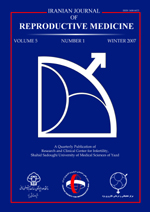
|
International Journal of Reproductive BioMedicine
Research and Clinical Center for Infertility, Shahid Sadoughi University of Medical Sciences of Yazd
ISSN: 1680-6433
EISSN: 1680-6433
Vol. 16, No. 3, 2018, pp. 191-198
|
 Bioline Code: rm18022
Bioline Code: rm18022
Full paper language: English
Document type: Research Article
Document available free of charge
|
|
|
International Journal of Reproductive BioMedicine, Vol. 16, No. 3, 2018, pp. 191-198
| en |
Psychometrics properties of the Iranian version of fertility quality of life tool: A cross- sectional study
Hekmatzadeh, Seyedeh-Fatemeh; Bazarganipour, Fatemeh; Hosseini, Nazafarin; Allan, Helen; Jalali, Somayeh; Abbasian, Zahra; Barani, Akram; Balochi, Fereshteh; Khademi, Saeideh; Mahmoudi, Tahereh; Niknam, Roghayeh; Khashavi, Zahra & Taghavi, Seyed Abdolvahab
Abstract
Background: Clinical measurement of quality of life (QoL) for assessing
reproductive problems should be considered as a standard investigation at the initial
and continuing medical consultations with infertile people.
Objective: The purpose of this study was comprehensive testing the psychometric
properties of the Iranian version of fertility quality of life (FertiQoL).
Materials and Methods: This cross-sectional study was conducted on300 women
referred to infertility clinic. After linguistic validation, a semi-structured interview
was conducted to assess face validity. Consequently exploratory factor analysis was
performed to indicate the scale constructs. Discriminate validity was assessed using
the known groups comparison. Convergent validity was evaluated by assessing the
correlation between similar content on the 12-Item Short Form Health Survey
(SF12), Hospital Anxiety and Depression Scale and FertiQol. In addition, reliability
analysis was carried out with internal consistency.
Results: The reliability of the Iranian version of the FertiQoL was satisfactory in all
dimensions (0.77-0.83). Six factors (emotional, mind/body, relational, social,
environmental, and tolerability) were extracted from the results of exploratory factor
analysis. Discrimination validity showed that FertiQoL can differentiate between
female patients with differing duration of infertility and number of children.
Moreover, the results of convergent validity showed a favorable correlation between
the related dimensions of SF12 (0.43-0.68), Hospital Anxiety and Depression Scale
(0.47-0.52) and FertiQoL.
Conclusion: The Iranian version of FertiQoL is valid and reliable for assessing
infertility problems and the effects of treatment on QoL of infertile patients referred
for diagnosis and treatment at infertility clinic.
Keywords
Fertility; Quality of life; Validity; Reliability; Iran
|
| |
© Copyright 2018 - International Journal of Reproductive BioMedicine
Alternative site location: http://www.ijrm.ir
|
|
